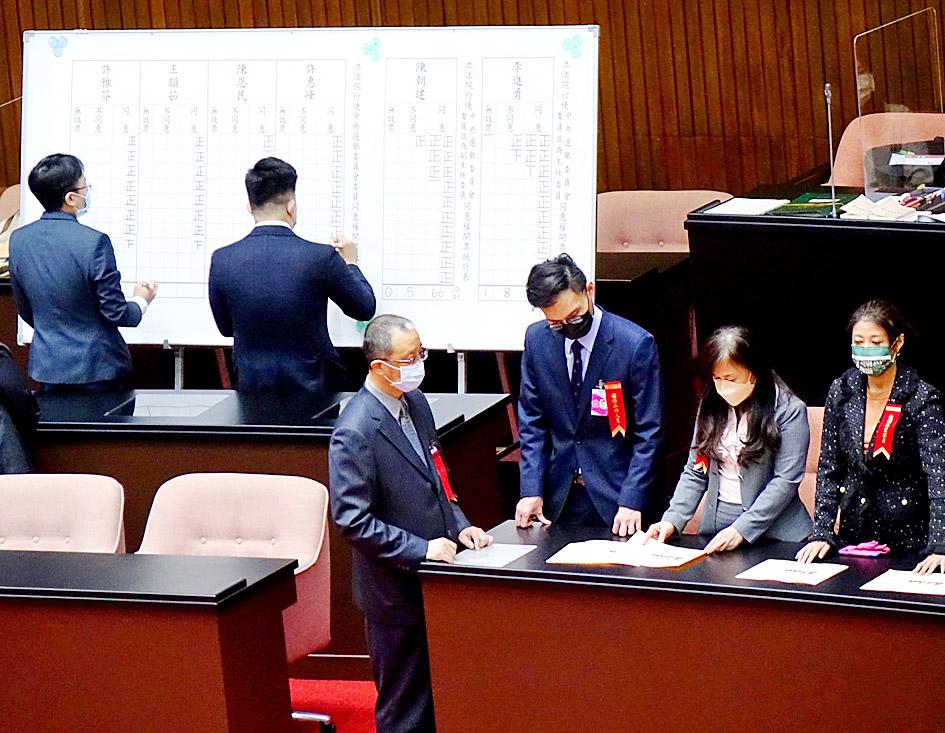The Legislative Yuan yesterday confirmed the Executive Yuan’s nominations of Lee Chin-yung (李進勇) and Chen Chao-chien (陳朝建) for another four-year term as chairman and vice chairman respectively of the Central Election Commission (CEC).
The four-year terms of six incumbent commission members are set to expire on Wednesday next week, and the Cabinet submitted a list of six nominees to fill those positions.
Of the nominees, who were initially approved by legislative committees on Sept. 29, four are incumbents — including the CEC chairman and vice chairman — and two are new members.

Photo: Chu Pei-hsiung, Taipei Times
In the vote conducted by secret ballot on Tuesday, 71 of the 113 legislators cast votes for the nominees, while 42 abstained.
The Chinese Nationalist Party (KMT) said that its 38 lawmakers would not participate in the vote.
The Taiwan People’s Party, with five lawmakers, and the New Power Party, with three legislators, said their members would vote, but would oppose the confirmation of Lee.
Lee is a veteran politician who gave up his membership in the Democratic Progressive Party to ensure neutrality after he was nominated in early 2019 to head the commission
He received 62 of the 71 votes that were cast, while Chen was confirmed by a 66-5 margin.
The two other incumbents — Chinese Culture University Department of Law director Hsu Hui-feng (許惠峰) and lawyer Chen En-min (陳恩民) — were confirmed by unanimous 71-0 votes.
The new nominees — Wang Yun-ju (王韻茹), a professor at National Chung Cheng University’s Department of Law, and lawyer Hsu Ya-fen (許雅芬) — were also confirmed by unanimous consent.
The six confirmed members are to serve from Thursday next week to Nov. 3, 2025.

The Ministry of Education (MOE) is to launch a new program to encourage international students to stay in Taiwan and explore job opportunities here after graduation, Deputy Minister of Education Yeh Ping-cheng (葉丙成) said on Friday. The government would provide full scholarships for international students to further their studies for two years in Taiwan, so those who want to pursue a master’s degree can consider applying for the program, he said. The fields included are science, technology, engineering, mathematics, semiconductors and finance, Yeh added. The program, called “Intense 2+2,” would also assist international students who completed the two years of further studies in

Former president Tsai Ing-wen (蔡英文) departed for Europe on Friday night, with planned stops in Lithuania and Denmark. Tsai arrived at Taiwan Taoyuan International Airport on Friday night, but did not speak to reporters before departing. Tsai wrote on social media later that the purpose of the trip was to reaffirm the commitment of Taiwanese to working with democratic allies to promote regional security and stability, upholding freedom and democracy, and defending their homeland. She also expressed hope that through joint efforts, Taiwan and Europe would continue to be partners building up economic resilience on the global stage. The former president was to first

Former president Tsai Ing-wen (蔡英文) on Monday called for greater cooperation between Taiwan, Lithuania and the EU to counter threats to information security, including attacks on undersea cables and other critical infrastructure. In a speech at Vilnius University in the Lithuanian capital, Tsai highlighted recent incidents in which vital undersea cables — essential for cross-border data transmission — were severed in the Taiwan Strait and the Baltic Sea over the past year. Taiwanese authorities suspect Chinese sabotage in the incidents near Taiwan’s waters, while EU leaders have said Russia is the likely culprit behind similar breaches in the Baltic. “Taiwan and our European

The Taipei District Court sentenced babysitters Liu Tsai-hsuan (劉彩萱) and Liu Jou-lin (劉若琳) to life and 18 years in prison respectively today for causing the death of a one-year-old boy in December 2023. The Taipei District Prosecutors’ Office said that Liu Tsai-hsuan was entrusted with the care of a one-year-old boy, nicknamed Kai Kai (剴剴), in August 2023 by the Child Welfare League Foundation. From Sept. 1 to Dec. 23 that year, she and her sister Liu Jou-lin allegedly committed acts of abuse against the boy, who was rushed to the hospital with severe injuries on Dec. 24, 2023, but did not